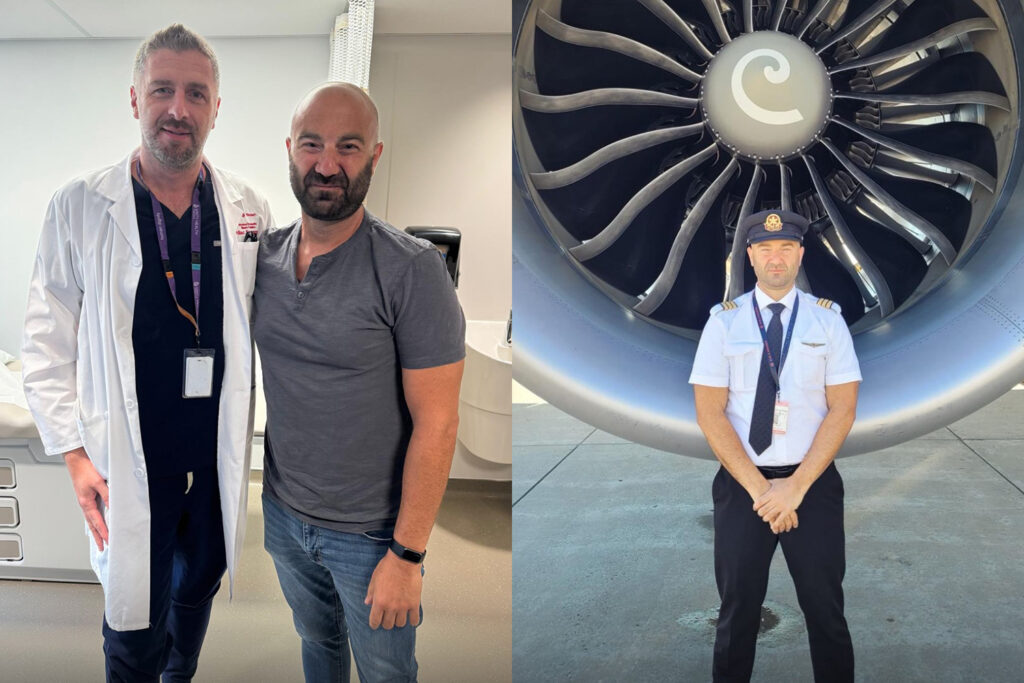Grounded by fate, lifted by hope: A pilot’s fight for his heart and future

Life can change in an instant, but this story doesn’t begin with uncertainty. It begins with a pilot who proactively took charge of his health – ensuring nothing would ground his passion for flying.
John Kezemidis, a 46-year-old pilot, was looking forward to a clean bill of health when he attended his routine pre-employment medical examination. “In 2015, the doctor determined I had a minor heart murmur that he wanted to get further investigated,” Kezemidis said. The finding came as a surprise, especially since he wasn’t experiencing any symptoms. However, given the demands and responsibility of being a pilot, it became imperative for John to closely monitor his condition to ensure both his health and the safety of his passengers.
“After doing additional cardiac workups and tests, they found that I had mitral valve regurgitation,” he says.
Sign up for the Unity Health Toronto newsletter, a monthly update on the latest news, stories, patient voices and research emailed directly to subscribers. If you haven’t subscribed yet, you can do that by clicking here.
The diagnoses shed light on an underlying condition that required ongoing monitoring and management – and might have gone unnoticed. For John, the discovery was a wakeup call, highlighting the importance of proactive healthcare.
After nearly a decade of monitoring, John’s regurgitation was getting progressively worse. During a consultation with a cardiologist, the decision was made to refer the case to a surgeon to explore the possibility of repair.
Dr. Gianluigi Bisleri, Director of Minimally Invasive Cardiac Surgery, stresses the importance of proactive cardiac care, “Addressing mitral valve issues in a timely fashion is crucial for improving the chances of successful valve repair, reducing the risk of heart rhythm complications like atrial fibrillation, and preventing irreversible damage that could lead to heart failure,” says Bisleri.
“I had two different consultations, and after speaking with Dr. Bisleri, we decided to proceed with the minimally invasive procedure,” Kezemidis said. “At first, I was apprehensive, but my neighbour had his valve repaired by Dr. Bisleri, and he answered a lot of my questions. Seeing Dr. Bisleri’s confidence during the hospital experience played a big role in making my decision to go ahead.”
The number one concern for any pilot is the risk of incapacitation mid-flight, a potentially catastrophic scenario. For Kezemidis, this reality made the procedure an urgent and necessary decision to safeguard his health and career in aviation.
“I reached out to a regulator at Transport Canada, and they patiently addressed all my questions about heart valve repair versus heart valve replacement,” Kezemidis said. Opting for a repair proved to be the best path forward.
Unlike replacement surgery, which often needs long term blood thinners and a lengthy recovery, repair provided a quicker path back to the skies. “I wanted to get it done now because I know I can recover faster at my age,” Kezemidis said.
On May 28, 2024, Kezemidis underwent a Mitral Valve Repair at St. Michael’s Hospital. It marked a turning point in his life. “From the moment I arrived, the experience was simply amazing,” he said. “Everyone I met was professional and caring. They excelled at showing empathy, understanding my concerns, and addressing them.”
Kezemidis said the hospital was an environment where stress was minimized, allowing him to focus on recovery. “It was a place where you truly felt supported, every step of the way,” he said.
Kezemidis was discharged three days after his procedure. “In terms of the recovery process, after four to six weeks I was feeling better, and I was able to stop taking the pain medication two weeks after the surgery,” he said.
Kezemidis is optimistic that his proactive approach to treatment will continue to benefit his health. “I’ve been coping with no flying by spending quality time with my family. I’ll return to work eventually, but for now, I want to cherish this time with my wife and kids, stay active, and contribute to my community,” he said. On Monday February 10, 2025, John Kezemidis was cleared to fly again, marking a significant milestone in his recovery.
“You often hear a lot of negative things about the Canadian healthcare system, but if you filter out the noise and experience the process at St. Michael’s Hospital, it’s completely the opposite of what’s being said,” he said.
He emphasized the importance of seeking guidance and expertise when faced with major medical decisions.
“Speak to as many professionals as you can, cardiologist, surgeons like Dr. Bisleri, who are confident, attentive, and respectful. Learn from people who have been through it, and work toward a course of action that’s best for you.”
